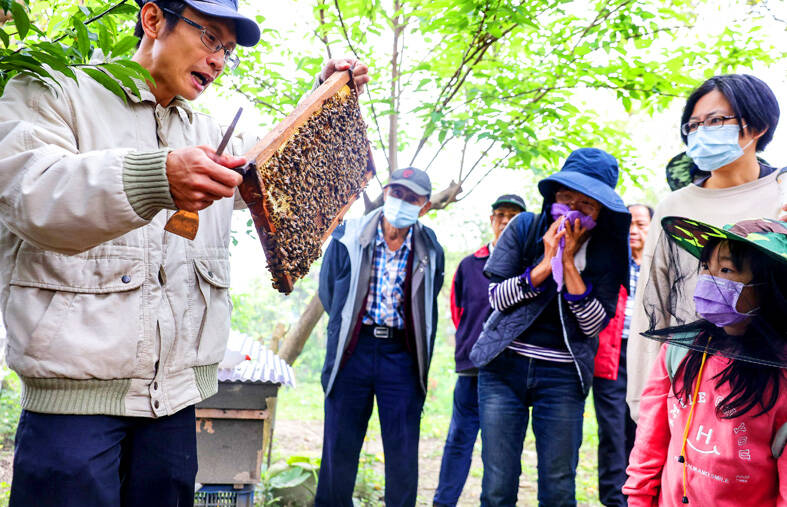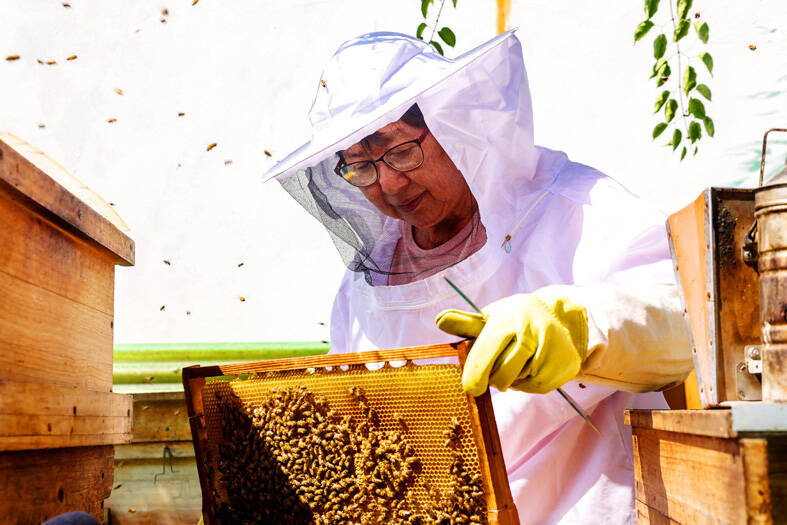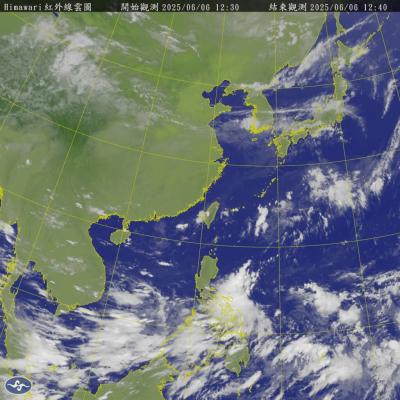Under mulberry trees at a bee farm in Taipei’s suburbs, students watched intently as instructor Tsai Ming-hsien (蔡明憲) wafted smoke over a hive box, explaining to aspiring apiarists how to keep the insects happy in an urban setting.
His audience included entrepreneurs, retirees and even a six-year-old who reached eagerly for a frame pulled from the box, as Tsai demonstrated how bees can be kept calm with a smoker.
“Many join my class out of curiosity,” said the 43-year-old instructor who also heads the Bee and Wasp Conservation Association of Taiwan. “They want to learn more about this insect, which has important economic values and a crucial role in agriculture.”

Photo: I-Hwa Cheng, AFP
Bee populations around the world are facing disaster from overuse of pesticides, predatory mites and extreme temperatures due to climate change.
That also spells catastrophe for humans, as three-quarters of the world’s main crops depend on bees to act as key pollinators.
Temperature and weather fluctuations in Taiwan have affected honey output in the past few years. From 2020 to 2021, it jumped nearly 60 percent to 13,260 tonnes, before dropping to 9,332 tonnes the following year.

Photo: I-Hwa Cheng, AFP
Recreational beekeeping in Taiwan has grown steadily over the past decade, with people tending about a dozen to up to 60 hive boxes in their yards or rooftop gardens, Tsai said.
“The city is overdeveloped with less green space and declining biodiversity,” he said. “We hope this creature will act as a key to open more knowledge about nature and ecosystems.”
Six-year-old Hsia Wei-yun, who attended a class last month, was thrilled to watch bees flitting on a box frame.
“I think it is a lot of fun keeping bees. I got to hold a bee frame,” she said excitedly.
Her mother, Hsia Cho-hui — who also brought along her son — said she had been concerned about whether there was enough nectar in the city, and fretted after one class that beekeeping seems “very complicated.”
However, the class has fueled her children’s interest in getting their own hive box, and “it would be a little difficult to dissuade them,” she said.
Some, like Edwin Huang, see Tsai’s class as a chance to make money while taking part in the “under-forest economy” — a practice of developing and selling eco-friendly products that help the environment.
“I think keeping bees can help improve the overall ecosystem ... it is a very positive activity for both personal and public reasons,” he said.
The 40-year-old produces colored dyes from aster, a flowering plant, that he grows on a hillside in New Taipei City, and plans to one day open a diner where he could serve the honey he produces.
“I am learning the techniques while researching my menu,” he said.
Retiree Sherry Liu, who took a class seven years ago and is now an avid apiarist, said she is “not in this to make money.”
She started with three hive boxes for bees that had flown into her rooftop garden and has expanded to 12.
“It is very healing to watch bees fly. They look very cute when they fly... It is a pleasure for me,” she said, dressed in protective headgear and a jacket as a swarm of bees flew around her.
Liu usually harvests honey three to four times a year, sharing the fruits of her labor with relatives, friends and neighbors.
She lamented that this year’s rainy and cold conditions have hit her production.
“I could not collect any winter honey because the weather was really bad and the bees ate all the honey” in their hives, she said, adding that it can be “quite troublesome to tend” to her boxes.
“You need to be loving — you cannot just keep them but not look after them,” she said.
Tsai said that he does not expect everyone who attends his class to become a bee farmer or keeper.
“But we hope at least [people] can get to know and understand them, and would not rush to destroy them when they appear,” he said.

STAY AWAY: An official said people should avoid disturbing snakes, as most do not actively attack humans, but would react defensively if threatened Taitung County authorities yesterday urged the public to stay vigilant and avoid disturbing snakes in the wild, following five reported snakebite cases in the county so far this year. Taitung County Fire Department secretary Lin Chien-cheng (林建誠) said two of the cases were in Donghe Township (東河) and involved the Taiwan habus, one person was bit by a Chinese pit viper near the South Link Railway and the remaining two were caused by unidentified snakes. He advised residents near fields to be cautious of snakes hiding in shady indoor areas, especially when entering or leaving their homes at night. In case of a

A tropical disturbance off the southeastern coast of the Philippines might become the first typhoon of the western Pacific typhoon season, the Central Weather Administration (CWA) said. The system lacks a visible center and how it would develop is only likely to become clear on Sunday or Monday, the CWA said, adding that it was not yet possible to forecast the potential typhoon's effect on Taiwan. The American Meteorological Society defines a tropical disturbance as a system made up of showers and thunderstorms that lasts for at least 24 hours and does not have closed wind circulation.

ENERGY RESILIENCE: Although Alaska is open for investments, Taiwan is sourcing its gas from the Middle East, and the sea routes carry risks, Ho Cheng-hui said US government officials’ high-profile reception of a Taiwanese representative at the Alaska Sustainable Energy Conference indicated the emergence of an Indo-Pacific energy resilience alliance, an academic said. Presidential Office Secretary-General Pan Men-an (潘孟安) attended the conference in Alaska on Thursday last week at the invitation of the US government. Pan visited oil and gas facilities with senior US officials, including US Secretary of the Interior Doug Burgum, US Secretary of Energy Chris Wright, Alaska Governor Mike Dunleavy and US Senator Daniel Sullivan. Pan attending the conference on behalf of President William Lai (賴清德) shows a significant elevation in diplomatic representation,

Credit departments of farmers’ and fishers’ associations blocked a total of more than NT$180 million (US$6.01 million) from being lost to scams last year, National Police Agency (NPA) data showed. The Agricultural Finance Agency (AFA) said last week that staff of farmers’ and fishers’ associations’ credit departments are required to implement fraud prevention measures when they serve clients at the counter. They would ask clients about personal financial management activities whenever they suspect there might be a fraud situation, and would immediately report the incident to local authorities, which would send police officers to the site to help, it said. NPA data showed